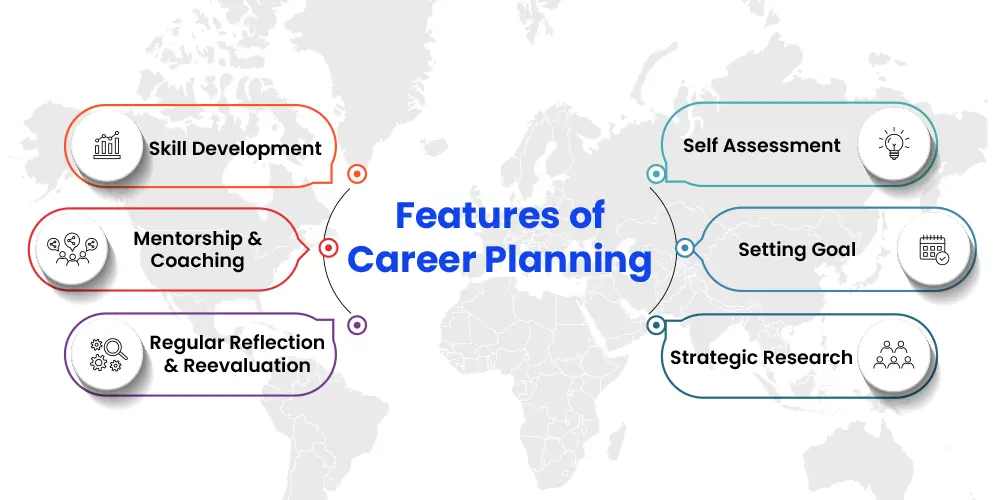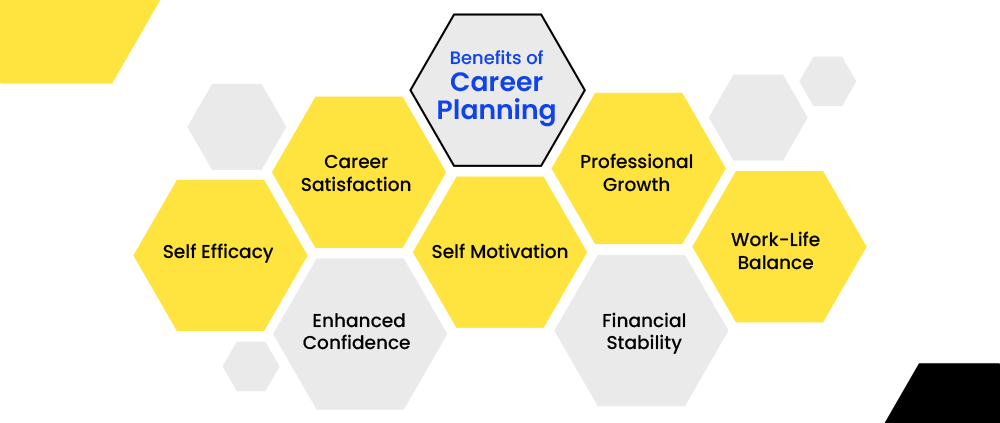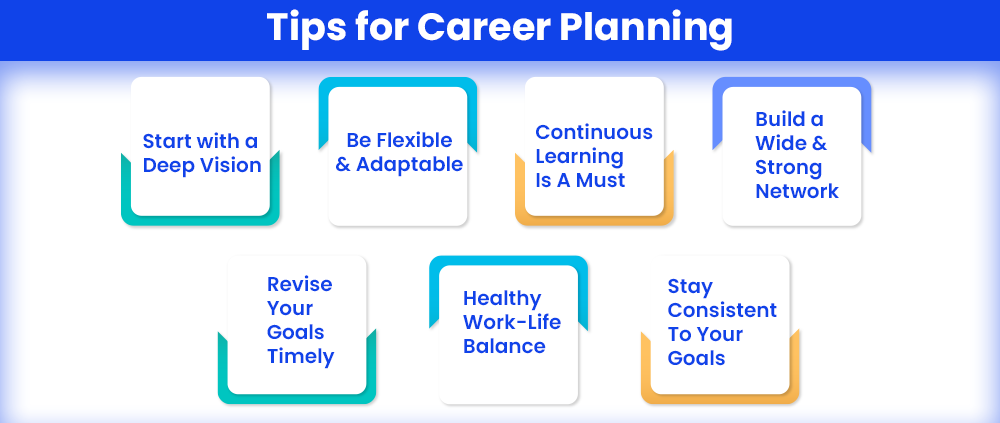Expert Interviews
- University Reviews
- Career Guide
 Video Counseling
Video CounselingImportant Facts
- Ask any Question - CV Forum

Master Career Planning: Definition, Features, and Benefits
Isha Adhikari Mar 24, 2025 1.1K Reads

Would a white doctor's coat suit me? Or making legal judgments in the magistrate court suit my personality or teaching a class full of students in a private school will be okay for me? If you are a student who has just passed their 12th class, then these kinds of questions will strike your mind.
Sometimes, these questions can leave you with a little anxiety or confusion, but worry not with a little research and strong career planning, you will ace your future path. In this blog, you will learn what career planning is and what are its objectives and features. You will also discover the benefits of career planning. So, let’s glide into this blog to know more about mastering the skill of career planning.
What Exactly Is Career Planning?
Career Planning is one of the most crucial frameworks that must be made by every student to give wings to their future career. This career planning helps the student by providing the student with a professional pathway. Career planning is not about making short-term plans or frameworks, but it means making long-term plans and strategies to shape your career structure.
Unlike short-term career goals or spontaneous decisions, master career planning is comprehensive, and long-term, and incorporates an understanding of an individual's skills, interests, values, and long-term objectives. It is a proactive process that involves continuous learning, strategic thinking, and regular reflection.
Since you are planning out your career in advance, it allows you to make changes according to your current situation or sudden circumstances. Advanced career planning helps you customize your needs and preferences according to the changing industries, economic conditions, and personal priorities.
Why Career Planning Is So Important?
Career planning is not only a framework that will help you reach your career goals or grab your dream job. It is much more than just building your career paths it includes aligning long-term goals and personal fulfilments. These are a few listed reasons why planning your career in advance is important.
- Makes You Adaptable In The Changing Market: Since you are planning your career in advance, you can easily make changes to it. The job market is an ever-evolving space with technological advancements, industry shifts, and economic fluctuations. Career planning helps you in adapting the changing environment and acts as per the needs of the market.
- Enhanced Job Satisfaction: Career planning in advance helps you in knowing your strengths and weaknesses. Once you are aware of your high and low points, you can easily incorporate these important points into your job. This strategy can help you find work that is meaningful and fulfilling, leading to higher job satisfaction.
- Achieving Long-Term Success: The prior planning of your career can help you in achieving long-term success. You can easily achieve significant milestones in your professional life. It can also prevent career stagnation by keeping your skills relevant and in demand.
- Helps In Reducing Mental Stress & Uncertainty: Career Planning helps in reducing your mental stress and uncertainty. It helps you in achieving a clear career path and provides a sense of direction, which helps reduce stress. When you know what you’re working toward, you can prioritize tasks and remain focused on your goals.

Features of Career Planning
A career plan is much more than a to-do list that you have to check or follow on a daily basis. It is a significant framework that helps you shape your future career. It is a multifaceted process that includes a wide range of elements and features.
Here are the primary and major features of career planning that help you in shaping your future career effectively:
- Self Assessment: Before planning your career it is important to do a self-assessment. One of the foundational elements of mastering the career planning is self-assessment. This process involves evaluating your strengths, weaknesses, skills, interests, values, and personality traits. Understanding yourself fully allows you to identify career paths that are most compatible with your unique characteristics. Self-assessment tools include:
- Personality Test: The personality test is one of the easiest yet significant steps in knowing your career. There is a wide range of tools for doing a personality test, such as the Myers-Briggs Type Indicator, Holland Code, and so many other tools that will help you perceive the world, plan, execute the work, and make the decisions.
- Skill Assessments: The self-assessments are a way to analyze one's knowledge, experience, abilities, and proficiency in the skills that are required for a particular job and career field. The skills assessments can also include different types of tests that can be tests, examinations, simulations, face to face or call interviews, and demonstrations.
- Interest Inventories: Interest Inventories are a type of questionnaire that assesses a person's interest, skill, or ability. These types of activities can help the learners understand their interests, values, and skills. It also helps the learners find their ideal career paths that match their interests, skills, knowledge, values, and experience the best. You can easily make insightful decisions about your education, career, and hobbies. It also helps you in boosting your self awareness and personal growth.
These tools provide a comprehensive analysis of your capabilities and preferences, helping you make informed decisions about your career trajectory.
- Goal Setting: Before making a career plan, it is important to have clear thoughts about your career goals. It is a very important feature if you want to master your career planning. Without having clear goals in your mind, it is critical to measure progress and stay concentrated or motivated toward your goals and objectives. Your goals must match this structure that is SMART in nature which means Specific, Measurable, Achievable, Relevant, and Time-Bounded. Career planning involves setting both short-term and long-term goals. Short-term goals might include gaining a certification or attending a specific training program, while long-term goals could involve earning a leadership position or starting your own business.
- Strategic Research: Do a strategic research about your career. This can include gathering information about industries, companies, job roles, and market trends. Strategic research provides insights that help you make decisions about which paths to pursue and which skills to develop. Some ways to conduct strategic research include:
- Industry Analysis: The most important aspect of a strategic research in career planning is to understand which industries are growing which sector is booming and which industries are declining. In fact, being a fresher your responsibility is to choose only those industries which are booming or will eventually grow in the future.
- Company Research: The second most important aspect of a strategic research in career planning is to do a deep research about the companies in which they are willing to join. It is also very important to learn and understand about the cultures, values, and opportunities within specific companies.
- Strong & Wide Networking: The third most important aspect of a strategic research in career planning is to build strong yet professional networks to gain first-hand knowledge and guidance. Making these kinds of connections can help you in grasping great career opportunities.
- Skill Development: To plan your career you also need to build your skill set. It emphasizes the importance of continuous skill development. The skills required in today's workforce change rapidly and staying competitive means being proactive about learning new skills and certifications. Skill development can take various forms, that includes:
- Formal Education: Your formal education that includes your schooling, college life, graduation, post-graduate training, and any other specialized course that provides you with a basic foundation of your skill development.
- Workshops and Training: After your formal education (such as schooling, graduation or post graduation, or other specialized training or courses), you need to sharpen your skills by connecting yourself with workshops, training, and short term learning programs so that you can focus on sharpening your specific skills.
- Online Learning Platforms: Nowadays, having formal education and short-term learning isn’t enough. You also need to enroll yourself in other certification courses. These courses can be completed either in paid or free versions of certificate courses. Websites like Coursera, Udemy, and LinkedIn Learning offer flexible learning opportunities.
- Mentorship & Coaching: After skill development, your next step must be to enroll yourself in a great mentorship and coaching program that can help you in seeking career advancement or other professional opportunities by providing invaluable data-driven insights. Furthermore, a mentor or coach can provide guidance, share industry insights, and hold you accountable for your goals. He/she can also provide you with support so that you can easily tackle the challenges.
- Regular Reflection & Revaluation: Career planning doesn’t remain constant or static but it requires a regular reflection and reevaluation. Since the professional business or corporate world changes it can also affect your choices and preferences. Therefore, it is important to keep an eye on your progress and what are the things that you need to customize to build your dream career. Regularly assessing your progress, adapting your goals, and modifying your strategies will help ensure that your career path remains aligned with your evolving aspirations.

Benefits of Career Planning
Career Planning is one of the most important aspects of a learner’s life since it provides them with a wide range of advantages that will help them in their personal and professional life. In this section, you will learn more about the benefits of career planning:
- It Helps In Improving Career Satisfaction and Self Motivation: The career planning helps you in deciding whether your interests or preferences are aligned with your professional career path. Since, if your interests align the best with your career path, then it helps you to stay focused, motivated, and innovative. Planning your career helps you analyze what career paths, roles, and responsibilities will suit your choices, knowledge, interests, and preferences the best. Remember, an ideal career path will help to bring the most satisfaction that will boost your enthusiasm and dedication in your professional career path.
- It Helps In Boosting Your Career Growth & Advancement: Since you are preparing a career journal to note your career progress rate and growth. It ensures that you are improving yourself by learning new skills and continuously learning new things that will help you match your desired career paths. It also helps you to know when you’re prepared and well-informed, you can seize opportunities that lead to promotions, new roles, or entrepreneurial endeavors.
- It Helps In Balancing Your Professional Life As Well As Your Personal Life: Career Planning helps you to make an informed decision that will go well with your professional as well as personal life. You can easily plan out your career goals while prioritizing your personal life, which will help in maintaining a healthy work-life balance. By setting boundaries and choosing paths that align with your lifestyle preferences, you can reduce burnout and maintain mental and emotional well-being.
- It Helps You By Providing Financial Stability and Security: The career planning helps you in choosing the right and stable career that will not just prioritize your personal interests but also provide you with financial stability. With an accurate career planning, you can customize your goals and objectives, and you can easily choose the right career for yourself that will provide you with professional benefits as well as higher salary packages. By targeting roles that have higher earning potential and opportunities for advancement, you can improve your financial security over time.
- It Helps You By Boosting Your Confidence and Self-Efficacy: Career planning helps you boost your confidence and self-efficacy. You can easily track the progress of your hard work and self-made strategies and can see visible improvements. You will gain a greater sense of self-efficacy, believing in your ability to set and achieve challenging goals. You can also work on your weaker sections, improve your weaknesses, and work more efficiently on your strengths.

Tips for Career Planning
This section will cover the ideal tips for making an ideal career plan that will leave you with an effective and efficient professional life, providing you with great benefits. So, let’s glide through this section to know more about the tips for career planning.
Begin With A Deep Vision: The success rate of career planning depends on how serious you are about your career. Always start with a deep vision that is relevant in nature and promises you a fulfilling career.
Be Flexible and Adaptable: The professional world is full of ups and downs that can fluctuate the marketplace. And according to that fluctuating market, you have to change your career plans and be prepared to adapt new tools and technologies to create new career opportunities.
Focus On Continuous Learning: As a learner, you need to stay up-to-date with the new industries. For that, you need to focus on continuous learning by enrolling in certification courses, short-term courses, and other online courses. This continuous learning will not only help you in boosting your academic profile but also help you in uplifting your professional life.
Conclusion
The career planning is a kind of framework that impact your professional life for a long-term. It is not just limited to land you to your dream career but it also help you to design a professional life that will be both rewarding and fulfilling for you. Therefore, it is important to analyze your goals, interests, and strengths and do a thorough research of it. However, stay consistent towards your career goals and objectives is very importantonly then you will be successful in achieving a career that provides you with happines and well being. So, start think about your strengths and key areas to overcome all the challenges and complexities that often act as a hurdle in achieving your dream career. Just keep in mind that, career planning is an ever-evolving process that you need to customize timely to be fit in a future that you envision.
FAQs (Frequently Asked Questions)
Career planning is a systematic process that involves evaluating one’s interests, skills, values, and goals to create a clear and structured approach to professional development. It enables individuals to make informed decisions about their career paths, set short- and long-term objectives, and take necessary actions to achieve them. Career planning is a proactive strategy that empowers individuals to shape their careers in alignment with personal strengths, industry demands, and growth opportunities.
The father of career planning is Frank Parsons. He gave a concept of aligning the interests and preferences of an individual to his/her career to achieve desired outcomes and help employees stay motivated in their professional lives. He is also known as the founder of the vocational guidance movement.
Career planning within Human Resource Management (HRM) has several objectives that focus on both the organization’s needs and individual growth. The key objectives include:
- Aligning Employee Goals with Organizational Objectives: Career planning ensures that employees’ personal career goals are aligned with the company’s long-term business goals, creating mutual benefit.
- Employee Development: HRM uses career planning to identify the skills, strengths, and potential of employees, offering opportunities for training and advancement, thereby developing a skilled workforce.
- Enhanced Job Satisfaction: By guiding employees toward roles that suit their interests and abilities, career planning helps enhance job satisfaction, reducing layoffs rates.
- Succession Planning: Career planning in HRM involves preparing employees for future leadership roles, ensuring that the organization has a pipeline of talent ready to step up when needed.
- Attracting and Retaining Talent: Companies that offer clear career paths and growth opportunities attract top talent, and proper career planning helps retain employees by meeting their professional aspirations.
Career planning encompasses several key features that contribute to its success:
- Self-Assessment: Understanding one’s skills, interests, and values is the foundation of career planning. Self-assessment tools like personality tests and skills inventories can help individuals gain clarity about their professional strengths and weaknesses.
- Goal Setting: Career planning requires setting both short-term and long-term goals. Short-term goals might involve gaining specific skills or certifications, while long-term goals could be advancing to a higher position or transitioning to a new field.
- Market Research: A well-rounded career plan involves understanding current and future job market trends. This helps individuals align their goals with the most promising industries or sectors for growth.
- Continuous Learning and Development: Career planning emphasizes the need for ongoing education and skill development to remain competitive in the ever-evolving job market.
- Mentorship and Strong Networking: Strong professional relationships and mentorship play a significant role in career planning. Networking can provide valuable insights, opportunities, and guidance from industry leaders.
- High Flexibility: Career plans should be flexible, as individuals may encounter changes in their interests, job market conditions, or personal circumstances that require adapting their career trajectory.
Career planning is crucial for several reasons:
- Clarity and Focus: It provides individuals with a clear roadmap of where they want to go professionally, helping them stay focused on their goals and avoid distractions.
- Increased Job Satisfaction: By aligning a person’s strengths and interests with their career path, career planning increases job satisfaction and motivation.
- Improved Skill Development: It encourages individuals to identify skills they need to improve or acquire to achieve their career goals, facilitating lifelong learning.
- Career Advancement: With a structured plan, individuals are better equipped to seize opportunities, improve their qualifications, and advance in their careers.
- Better Decision Making: Career planning helps individuals make informed decisions about job changes, promotions, or career transitions, ensuring choices align with their long-term goals.
- Reduced Stress: Knowing what steps to take next can reduce career-related anxiety and stress, as individuals have a clear sense of direction.
The career planning process typically follows 7 key steps:
- Self-Assessment: The first step is understanding your skills, interests, values, and personality traits. This can involve using self-assessment tools or reflecting on past experiences.
- Exploration of Career Options: Research various career paths that align with your interests and strengths. This may involve exploring different industries, job roles, and work environments to identify suitable options.
- Setting Career Goals: Based on your interests and research, set short-term and long-term career goals. These should be specific, measurable, achievable, relevant, and time-bound (SMART).
- Developing Skills and Qualifications: Identify the skills, knowledge, and qualifications required for your chosen career path. Focus on gaining the necessary education, certifications, and experience to make yourself a competitive candidate.
- Creating a Plan of Action: Break your career goals down into actionable steps. This may include setting milestones for completing courses, applying for jobs, or seeking out mentorship and networking opportunities.
- Implementing the Plan: Take active steps to implement your plan, such as applying for jobs, attending networking events, or enrolling in further training. Stay committed to your action plan.
- Review and Adjust: Periodically evaluate your progress and make adjustments as necessary. Career planning is an ongoing process, and you may need to shift your goals or tactics based on changing circumstances or new opportunities.

3 Years of Experience / Narrator
With 3 years of experience in content writing and copywriting and keen interest in voiceover and scripting, I, Isha Adhikari, am passionate about content creation and narration.
Every query is essential.
Our team of experts, or experienced individuals, will answer it within 24 hours.
Recommended for you
Tired of dealing with call centers!
Get a professional advisor for Career!
LIFETIME FREE
Rs.1499(Exclusive offer for today)

Pooja
MBA 7 yrs exp

Sarthak
M.Com 4 yrs exp

Kapil Gupta
MCA 5 yrs exp
or



Career Finder
(Career Suitability Test)
Explore and Find out your Most Suitable Career Path. Get Started with our Career Finder Tool Now!
ROI Calculator
Find out the expected salary, costs, and ROI of your chosen online university with our free calculator.
